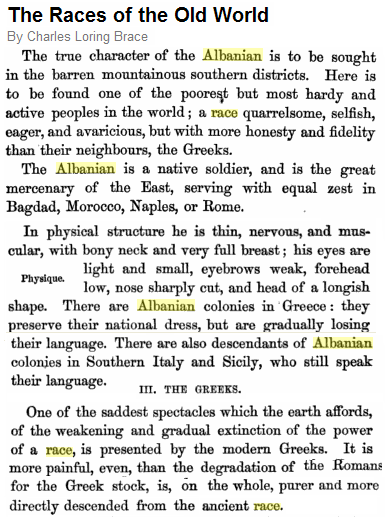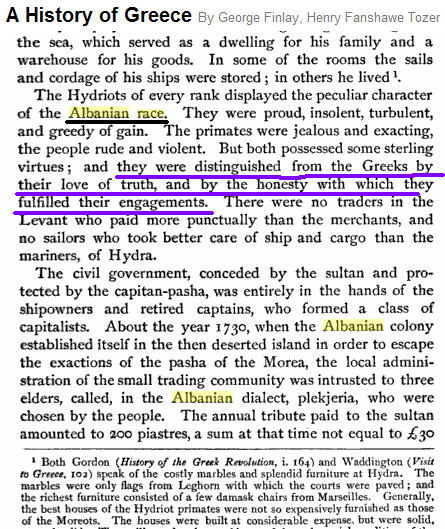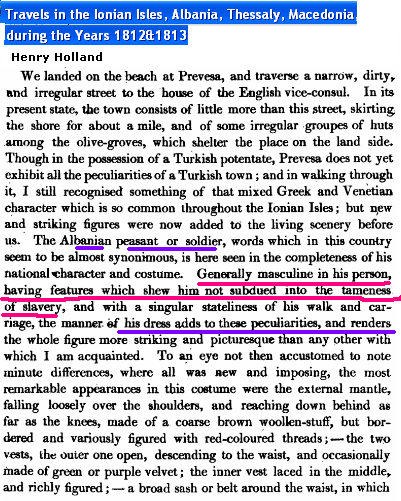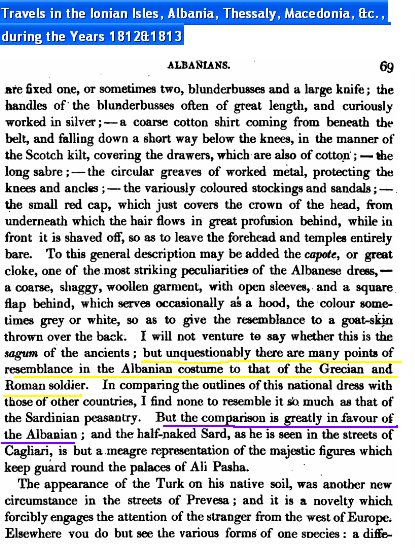Quotes about Albanians
+2
Leka
ZEUS10
6 posters
ARBËNIA :: Forum :: History :: Quotes Albanian history
Page 1 of 3
Page 1 of 3 • 1, 2, 3 

Leka- Moderator

-

Number of posts : 334
Registration date : 2009-01-27
Points : 64
Reputation : 20
 Re: Quotes about Albanians
Re: Quotes about Albanians
CAVALLI SFORZA
DIFFUSION OF GENES AND LANGUAGES
IN HUMAN EVOLUTION
ALBERTO PIAZZA
Dipartimento di Genetica, Biologia e Biochimica,
Università di Torino,
via Santena 19, 10126 Torino, Italy
alberto.piazza@unito.it
LUIGI CAVALLI SFORZA
Department of Genetics,
Stanford University,
Stanford, CA 94305,USA
cavalli@stanford.edu
In a study by Cavalli-Sforza et al. (1988), the spread of anatomically modern
man was reconstructed on the basis of genetic and linguistic pieces of evidence:
the main conclusion was that these two approaches reflect a common underlying
history, the history of our past still frozen in the genes of modern populations.
The expression `genetic history' was introduced (Piazza et al. 1988) to point out
that if today we find many genes showing the same geographical patterns in
terms of their frequencies, this may be due to the common history of our species.
A deeper exploration of the whole problem can be found in Cavalli-Sforza et al.
(1994). In the following, some specific cases of structural analogies between
linguistic and genetic geographical patterns will be explored that supply further
and more updated information. It is important to emphasize at the outset that
evidence for coevolution of genes and languages in human populations does not
suggest by itself that some genes of our species determine the way we speak;
this coevolution may simply be due to a common mode of transmission and
mutation of genetic and linguistic units of information and common constraints
of demographic factors.
A new treatment of the problem has been given in a still unpublished
analysis (Piazza et al., but see Cavalli-Sforza, 2000 where main results are
anticipated) of a set of lexical data (200 words) in 63 Indo-European languages
published by Dyen et al. (1992).
DIFFUSION OF GENES AND LANGUAGES
IN HUMAN EVOLUTION
ALBERTO PIAZZA
Dipartimento di Genetica, Biologia e Biochimica,
Università di Torino,
via Santena 19, 10126 Torino, Italy
alberto.piazza@unito.it
LUIGI CAVALLI SFORZA
Department of Genetics,
Stanford University,
Stanford, CA 94305,USA
cavalli@stanford.edu
In a study by Cavalli-Sforza et al. (1988), the spread of anatomically modern
man was reconstructed on the basis of genetic and linguistic pieces of evidence:
the main conclusion was that these two approaches reflect a common underlying
history, the history of our past still frozen in the genes of modern populations.
The expression `genetic history' was introduced (Piazza et al. 1988) to point out
that if today we find many genes showing the same geographical patterns in
terms of their frequencies, this may be due to the common history of our species.
A deeper exploration of the whole problem can be found in Cavalli-Sforza et al.
(1994). In the following, some specific cases of structural analogies between
linguistic and genetic geographical patterns will be explored that supply further
and more updated information. It is important to emphasize at the outset that
evidence for coevolution of genes and languages in human populations does not
suggest by itself that some genes of our species determine the way we speak;
this coevolution may simply be due to a common mode of transmission and
mutation of genetic and linguistic units of information and common constraints
of demographic factors.
A new treatment of the problem has been given in a still unpublished
analysis (Piazza et al., but see Cavalli-Sforza, 2000 where main results are
anticipated) of a set of lexical data (200 words) in 63 Indo-European languages
published by Dyen et al. (1992).
From a linguistic distance matrix whose elements are the fraction of words with the same lexical root for any pair of languages and its transformation to make the matrix elements proportional to
time of differentiation, we were able to reconstruct a linguistic tree. The root of the tree separates Albanians from the others, with a reproducibility rate (the error in reconstructing the tree) of 71 percent. The next oldest branch is Armenian. The simplest interpretation is that the language of the first migrant Anatolian farmers survives today in two direct descendants, Albanian and Armenian, which diverged from the oldest pre-Indo-European languages in different directions but remained relatively close to the point of origin. If we give to the first split the time depth of the beginning of the expansion of the pre-Indo-European Anatolian farmers, about 9,000 years ago....
 Re: Quotes about Albanians
Re: Quotes about Albanians
Kombet nuk janë insekte që mund të heqin dorë dhe të braktisin aq kollaj kombësinë, gjuhën, zakonet dhe traditat e tyre si gjarpërinjtë që ndërrojnë lëkurën, të mohojnë etërit, mëmëdheun dhe fisnikërinë e tij, traditat e trimërisë së vet; është anakronizëm dhe e padëgjuar që në historinë e kombeve të gjejmë një popull aq haram dhe indiferent ndaj vetvetes.
Anastas Kullurioti
 Re: Quotes about Albanians
Re: Quotes about Albanians
We now come to the third division of the Albanian language, which consists of unknown roots, or at least of such as have not hitherto been explained; we might at first have been apt to leave the examination of the subject to orientalists, and to suppose that these words were exclusively of Asiatic origin, because they are apparently foreign to every known European language. But as we have ocassionaly been able to account for some of these roots, and to connect them, in spite of their irregularity, with the Hellenic and other European dialects, we were led to conclusion that the primitives of a pure and indigenous language like the Albanian, must have been at one time common to the Thracian, Illyrian, Phrygian and Lydian, and that the uknown roots are not the least valuable part of each or all these languages. The Albanian .. might become as useful, in an historical point of view, as the language of the Orpheus or Deucalion, and might enable us to explain the meaning attached to the names of many ancient people and places.
Universal Geography by M. Malte-Brun 1829
 Re: Quotes about Albanians
Re: Quotes about Albanians
Childe Harold’s Pilgrimage (1812-1819), which Byron had begun writing while in Albania, Scanderbeg and his warrior nation are described in the following terms:
Canto II, LXV.George Castriot, surnamed Scanderbeg, King of Albania
Land of Albania! where Iskander rose, Theme of the young, and beacon of the wise, And he his namesake, whose oft-baffled foes Shrunk from his deeds of chivalrous emprize: Land of Albania! let me bend mine eyes On thee, thou rugged nurse of savage men! The cross descends, thy minarets arise, And the pale crescent sparkles in the glen, Through many a cypress grove within each city’s ken.” Canto II, XXXVIII. “Fierce are Albania’s children, yet they lack not virtues, were those virtues more mature. Where is the foe that ever saw their back? Who can so well the toil of war endure? Their native fastnesses not more secure Than they in doubtful time of troublous need: Their wrath how deadly! but their friendship sure, When Gratitude or Valour bids them bleed Unshaken rushing on where’er their chief may lead.
Canto II, LXV.George Castriot, surnamed Scanderbeg, King of Albania
 Re: Quotes about Albanians
Re: Quotes about Albanians
Byron 1.2.58
Byron’s ‘Letters and Journals’ Volume 1: 12 November 1809, PREVESA - ALBANIA
Letter to his Mother
These are his words (p.279).
The arnaouts or Albanese, struck me forcibly by their resemblance to the Highlanders of Scotland, their very mountains, the kilt thought white, the spare active form, their dialect Celtic in sound, and their hardy habits, all carried me back….”so would their fierce interfamily blood feuds, and their goatskin and pigskin bagpipes softened with warm water and oil, whose gay, flutelike melody was accompanied by a low drone quite like that of the Scotish highland bagpipe music
Byron’s ‘Letters and Journals’ Volume 1: 12 November 1809, PREVESA - ALBANIA
Letter to his Mother
.My Dear Mother, I have been some time in Turkey: this place is on the coast, but I have traversed the interior of the province of Albania on the visit to the Pascha. I left Malta … on the 21st of September and arrived in eight days at Prevesa. I thence have been about 150 miles, as far as Tepeleen, his Highness’s country palace, where I stayed three days. The name of the Pascha is Ali and he is considered a man of the first abilities: he governs the whole of Albania (the ancient Illyricum), Epirus, and part of Macedonia. His son Vely pascha … governs Morea, and has great influence in Egypt … .
When I reached Yanina, the capital, after a journey of three days over the mountains, through a country of the most picturesque beauty, I found that Ali Pascha was in Illyricum … He had heard that an Englishman of rank was in his dominions, and had left orders in Yanina with the comandant to provide a house, and supply me with every kind of necesseties, gratis … I have not been permitted to pay for a single article of household consumption… (page 275)
I shall never forget entering Tepeleen … The Albanians, in their dresses (the most magnificient in the world, consisting of a long white kilt, gold-worked cloak, crimson velvet gold-laced jacket and waistcoat, silver-mounted pistols and daggers)…
The next day I was introduced to Ali Pascha (p.276), his highness is sixty years old, very fat, and not tall, but with a fine face, light blue eyes, and a white beard; his manner is very kind … he called my Albanian soldier who attends me, and told him to protect me at all hazard; his name is Veseliu, and, like all the Albanians, he is brave, rigidly honest, and faithful; but they are cruel, though not treacherous, and have several vices but no meannesses. They are, perhaps, the most beautiful race, in point of countenance, in the world... (p.277)
I could tell you I know not how many incidents that I think would amuse you, but they crowd on my mind as much as they would swell my paper, and I can neither arrange them in the one nor put them down on the other, except in the greatest confusion. I like the Albanians much; they are not all Turks, some tribes are Christians. But their religion makes little difference in their manner or conduct… I lived on my route, two days at once, and three days again, in a barrack at Salora …, I have had nothing stolen, and was always welcome to their provision and milk. Not a week ago an Albanian chief … after helping us out of the Turkish galley, feeding us, and lodging my suite, consisting of Fletcher, a Greek, two Athenians, a Greek priest and my companion, Mr. Hobhouse, refused any compensation … and when I pressed him to accept a few sequins, ‘No’, he replied; ‘I wish you to love me, not to pay me’
These are his words (p.279).
 Re: Quotes about Albanians
Re: Quotes about Albanians
In 3200 BC, there were many, many languages spoken besides Sumerian and Egyptian, but they were not fortunate enough to have a writing system. These languages are just as old. To take one interesting case, the Albanian language (spoken north of Greece) was not written down until about the 15th century AD, yet Ptolemy mentions the people in the first century BC.* The linguistic and archaeological evidence suggests that Albanians were a distinct people for even longer than that. So Albanian has probably existed for several millennia, but has only been written down for 500 years. With a twist of fate, Albanian might be considered very “old” and Greek pretty “new”.
Elizabeth J. Pyatt, Linguistic PhD
 Re: Quotes about Albanians
Re: Quotes about Albanians
This entire Part 5 was originally written in French by Pagnel, a writer in the XV century in his publication entitled ÒTHE TURKS AND THE HISTORY OF SKANDERBEGÓ. [NOTE: It was translated into Italian (perhaps by Conforti?) (translated this draft from Italian to English , Vara, 1997)
-----------------------------------------------------------------------------------------------------------
The letter to Skanderbeg:
Ò Giovanni Antonio, Prince of Taranto, to Georgio albanese, greeting.
Response letter:
Letter from Skanderbeg to the Prince of Taranto:
ÒGiorgio, gentleman of Albania, to Giovanni Antonio, Prince of Taranto, greeting
-----------------------------------------------------------------------------------------------------------
The letter to Skanderbeg:
Ò Giovanni Antonio, Prince of Taranto, to Georgio albanese, greeting.
(Conveniva a te?), that the luck you had shown in the war with the enemies of the Christian religion, which sometimes had forced combat, then leaving that field, you came to Italy to drive your armies against Christians? What cause do you hold against me? What have I done against you? What controversies do they make between us? You have spoiled my territories and are crudely giving vent against my subjects, and first you have (mosso?) the war that (proposta?). You boast that you are a great warrior for the Christian religion and (pur?) yet you persecute this (geate?) which for every reason is called Christianity. You have turned your iron against the French of the Kingdom of Sicily. Perhaps you have thought to take the army against the effeminate Turks that you are accustomed to wounding in the back.
You will find other men who all support your proud appearance (?) and no one will avoid your face. Our Italian soldiers will challenge you very well and have no fear of the Albanese. We already know your generation and respect the Albanese like sheep, and it is an embarrassment to have such cowardly people for enemies; (neÕ?) would you have embarked on such a business if you had stayed to dwell in your house. You have avoided the onslaught of the Turks, and not having the power to defend your own house, have thought to invade other peopleÕs. You are deceitful. Instead of a new house you are looking for your grave.
Goodbye..... .Ó
Response letter:
Letter from Skanderbeg to the Prince of Taranto:
ÒGiorgio, gentleman of Albania, to Giovanni Antonio, Prince of Taranto, greeting
"Having made a truce with the enemy of my religion I have not wanted that my friend remain (fraudato) of my aid. (Spesse?) times, Alfonso, his father, invited my help while I waged war against the Turks. Therefore I would be very ungrateful if I had not resisted (lÕistesso?) service to his son. I remember what your king did because now (non deve vedere succedergli? ) this who is his son? You adored his father, and why now do you try to throw out his son? Where did this power come from? Who has the power to set up the King of Sicily, you or the Roman Pontiff?
I came to aid Ferrante, son of the king and seat of the Apostolica. I came opposing your unfaithfulness and innumerable great betrayals in this kingdom. (NeÕ?) will you ever be unpunished for your perjury. This is the reason for my war against you. I merit this no less than I merited making war against the Turks, nor are you less Turk than them. (ImperoccheÕ vi sono alcuni?) that guide you in a straight line not to be of some sect. You my opponents the French and the names of those people, and those for the religion wage grand war.
I do not want to dispute ancient matters with you, matters that perhaps were much less than what was told about them. Certainly in our times the Aragonese armadas have often coursed the Aegean Sea, have plundered the Turkish coasts, have (riportata?) the prey of the enemies; and even today the Aragonese armies defend Troja from the jaws of the enemy. Why do I remember the old things and leave the new parts? If they change the family costumes and the plowmen of the kingdom, and the kings of the plowmen return? (NeÕ troverai nobilitaÕ piuÕ antica della virtuÕ.)
Nor can I deny that you are not with the obnoxious French nation, (imperoccheÕ) you being mainly in aid of King Alfonso, you hunted the French of this kingdom. I do not know now what new virtue shines in this. Perhaps it is some new star that you have now seen among the French?
Moreover, you scorned our people, and compared the Albanese to sheep, and according to your custom think of us with insults. Nor have you shown yourself to have any knowledge of my race. My elders were from Epirus, where this Pirro came from, whose force could scarcely support the Romans. This Pirro, who Taranto and many other places of Italy held back with armies.
I do not have to speak for the Epiroti. They are very much stronger men than your Tarantini, a species of wet men who are born only to fish. If you want to say that Albania is part of Macedonia I would concede that a lot more of our ancestors were nobles who went as far as India under Alexander the Great and defeated all those peoples with incredible difficulty. From those men come these who you called sheep. But the nature of things is not changed. Why do your men run away in the faces of sheep? In the past the Albanese have (fatto?) experience if the Pugilese were armed; (neÕ) I would again find some who would have been able to aspired to my nature. I have well noted from the back how many of your soldiers are well armed but have never been able to see their helmets or (tanpoco?) the face except those that have become prisoners. (NeÕ?) I seek your house (Bastandomi? ) my own. Besides, it is well known that you often would have shot your neighbors for their possessions, as now you would force out the king of your house and your kingdom.
(Che se?) If I fall in the difficult task I have embarked on I will be buried as (mi vai?) wishing in your letter, will bring back my soul as a reward from the Chancellor of the universe, of God. Not only will I have perfected my intention, but also I will have planned and attempted some distinguished deed.
Good bye....Ó
 Re: Quotes about Albanians
Re: Quotes about Albanians
Letra e Skenderbeut drejtuar Sulltanit
Stefano Zannoeich letra eshte e arkivuar ne kishen katedrale te Shen Venerandes ne Cetinje, ku jane dokumentet e familjes se Stefan Cernovicit, qe ishte martuar me te motren e Skenderbeu
Stefano Zannoeich letra eshte e arkivuar ne kishen katedrale te Shen Venerandes ne Cetinje, ku jane dokumentet e familjes se Stefan Cernovicit, qe ishte martuar me te motren e Skenderbeu
Sulltan i turqve, mora letren tende dhe kjo eshte pergjigjja ime. Te them te verteten, nuk te dua shume, po dua te kesh shume shendet dhe miresi. Per simpatine qe ti thua se ke per mua, te jam shume i detyruar, por nuk e dua miqesine tende. Po te pranoja te isha nje here miku yt, do te isha perjete. Po paqen e dua shume, jo per vullnetin tim, por qe te tregoj te populli - zot i te cilit jam nga e drejta e lindjes, e perendise dhe e shpates dhe nga dashuria e zemres sime - se nuk mendoj mbi kurriz te jetes dhe te lumturise se tij.
Nuk njoh tjeter fame per nje kryetar, pervecse lumturise se popullit te vet. Kur ti do te mendosh keshtu, ndoshta atehere do te gezohesha me miqesine tende.
Dora e perendise le te jete ajo, e cila do te udheheqe ty ne veprat tuaja. Mirupafshim.
 Re: Quotes about Albanians
Re: Quotes about Albanians
The Harvard anthropologist Carleton S. Coon found a connection between the Illyrians and the Dorians based on his anthropological analyses of the Albanian and Montenegrin population as well as the Sfakian population in Crete. Coon discovered that Montenegro and Albania is highly concentrated Illyrian racial zone and that the Sfakians are directly descended from Doric tribes that invaded Crete from the direction of Macedonia and Illyria. Moreover, he discovered that Albanians, Montenegrins and Sfakians shared many similarities in stature, appearance, language, national costume, belligerent tendencies, tribal orders, and vendettas.
 Re: Quotes about Albanians
Re: Quotes about Albanians
1774, Leipzig, Johan Tunman, “Kërkime në historinë e popujve të Evropës Lindore”.
Johan Erik Tunman (1746-1778)”Untersuchungen uber die Geschichte oestlichen europaeischen Voelker”. 1774
.Asnjë popull tjetër i botës në të cilën ne jetojmë, nuk është aq i panjohur për evropianët e perëndimit për sa i përket prejardhjes, historisë dhe gjuhës, sa shqiptarët.”E megjithatë, ata janë popuj kryesorë, të lashtë e të rëndësishëm, që çdo historian do të dëshironte t’i njihte: historia e tyre do të plotësonte zbrazëti të mëdha në historinë e vjetër e të re të Evropës. Por… ata sot nuk luajnë më ndonjë rol të veçantë. Ata janë të nënshtruar, ata janë fatkeq dhe historiani shpesh është po aq i padrejtë, sa dhe njeriu i zakonshëm; ai nuk i përfill ata që nuk i ka prirë fati
Johan Erik Tunman (1746-1778)”Untersuchungen uber die Geschichte oestlichen europaeischen Voelker”. 1774
No other race in the living World is such unknown for the western Europians like the Albanians are. Nevertheless, they used to be the main race in the antiquity playing a dominant role in it, so any scholar who study history would be interested for. Their history would have filled the great gaps in the history of Europe old or new whatsoever. However… now, they dont play any special role anymore. Now they are subservient, they are unfortunate, and the western historians in these circumstances behave in an unfair way, the same with regular people, they dont have respect for the unfortunate ones.
 Re: Quotes about Albanians
Re: Quotes about Albanians
Montenegrins `Races of Europe’ Carlton S. Coon Chapter 14:The Greeks 1939
The Montenegrins, who are the tallest people in Europe… are linguistically Serbs, but there can be no question that they are to a large extent Slavicized Albanians; the cultural continuity between the two peoples is striking, the only real differences being those of language and religion
 Arnauts this proud race
Arnauts this proud race
But of all the regions I have seen, the Arnaut seems to me the most particular. They are natives of Arnaoutlich, the ancient Macedonia, and still retain something of the courage and hardiness, though they have lost the name, of Macedonians, being the best militia in the Turkish empire, and they only check upon the janissaries. They are foot soldiers; we had a guard of them, relieved in every considerable town we passed: they are all clothed and armed at their own expense, generally lusty young fellows, dressed in clean white coarse cloth, carrying guns of a prodigious length, which they run with on their shoulders as if they did not feel the weight of them, the leader singing a sort of rude tune, not unpleasant, and the rest making up the chorus. These people, living between Christians and Mahometans, and not being skilled in controversy, declare that they are utterly unable to judge which religion is best; but, to be certain of not entirely rejecting the truth, they very prudently follow both and go to the mosques on Fridays and the church on Sundays, saying for their excuse, that at the day of judgement they are sure of protection from the true prophet; but which that is, they are not able to determine in this world. I believe there is no other race of mankind have so modest an opinion of their own capacity. These are the remarks I have made on the diversity of religions I have seen…”
Letters from the Right Honourable Lady Mary Wortley Montagu. 1709 to 1762. Ed. By Ernest Rhys, Everyman’s Library, Essays. London etc.1925, p. 109
 Re: Quotes about Albanians
Re: Quotes about Albanians
"If the Emperors of Byzantium would have been Skanderbegs, the Roman Empire would have survived."
Voltaire, 1762, Works, Vol 3
 Re: Quotes about Albanians
Re: Quotes about Albanians
"The Albanians have been born to resist and disobey."
Dursam Bey, during the second siege of Kruja
 Re: Quotes about Albanians
Re: Quotes about Albanians
-"They are Nietzsche's over-men, these primitive Albanians — something between kings and tigers."
Henry Noel Brailsford
 Re: Quotes about Albanians
Re: Quotes about Albanians
"The men who marched to Babylon , Persia and India were the ancestors of the Albanians..."
Wadham Peacook
 Re: Quotes about Albanians
Re: Quotes about Albanians
"In the list of heroes, John Hunyadi and Scanderbeg are commonly associated and entitled to our notice since their occupation of arms delayed the ruin of the Greek (Byzantine) Empire. ..... The Albanian prince may justly be praised as a firm and able champion of his national independence. The enthusiasm of chivalry and religion has ranked him with the names of Alexander the Great and Pyrrhus. .....''
Historian Edmond Gibbon in his Decline and Fall of the Roman Empire
 Re: Quotes about Albanians
Re: Quotes about Albanians
"Scanderbeg exceeds all the officers, ancient and modern, in the conduct of a defensive army. I met him in Turkish history but nowhere else.''
Major General James Wolfe, commander of the English army at the siege of Quebec, Canada, writting to Lord Sydney
 Re: Quotes about Albanians
Re: Quotes about Albanians
-"The Gueghes are thickset and muscular, the Toskes slender and agile, both strong, vigorous, and perhaps the finest race in Europe."
"The characteristics common to both people are love of independence, love of war, a revengual spirit, mering into ferocity."
"They are wild, plundering, indefatigable soldiers, selling their services and their blood to those who pay them highest; but lively, gay, adventurous, sober, generous and heroic so soon as it concerns the defence of their country, their tribe, or their family."
"They are an iron race, as hard as the rocks they inhabit."

Lord Byron talking about Albanians
Last edited by ZEUS10 on Thu Mar 05, 2009 11:24 am; edited 1 time in total
 Re: Quotes about Albanians
Re: Quotes about Albanians
ZEUS10 wrote:
Ahhh Zeus kjo na ka prish pune ne shume, sado qe jane vyrtyte te mira.

AuLoNa- No rank

-

Number of posts : 1002
Location : USA
Humor : Plenty..:)
Registration date : 2009-01-27
Points : 118
Reputation : 33
 Re: Quotes about Albanians
Re: Quotes about Albanians
AuLoNa wrote:ZEUS10 wrote:
Ahhh Zeus kjo na ka prish pune ne shume, sado qe jane vyrtyte te mira.
That saying was made 130 years ago, Albanians still preserves this virtue but now they know how to behave as good citizens.
 Re: Quotes about Albanians
Re: Quotes about Albanians
ZEUS10 wrote:AuLoNa wrote:
Ahhh Zeus kjo na ka prish pune ne shume, sado qe jane vyrtyte te mira.
That saying was made 130 years ago, Albanians still preserves this virtue but now they know how to behave as good citizens.
E di, e kisha me teper tek pjesa e dyte e "honor and faithful even unto death".
Keta ketej se kuptojne mire, sidomos ne ditet e sotme!

AuLoNa- No rank

-

Number of posts : 1002
Location : USA
Humor : Plenty..:)
Registration date : 2009-01-27
Points : 118
Reputation : 33
Page 1 of 3 • 1, 2, 3 
 Similar topics
Similar topics» Sam Vaknin and the history of the Albanians
» Philosophical Quotes
» The Serbian forgeries
» Hello you great Albanians.
» Ngjela: Presidenti te kerkoje hetim per Kseren
» Philosophical Quotes
» The Serbian forgeries
» Hello you great Albanians.
» Ngjela: Presidenti te kerkoje hetim per Kseren
ARBËNIA :: Forum :: History :: Quotes Albanian history
Page 1 of 3
Permissions in this forum:
You cannot reply to topics in this forum
 Portal
Portal Home
Home Gallery
Gallery Search
Search Register
Register Log in
Log in ZEUS10 Thu Jan 29, 2009 6:51 pm
ZEUS10 Thu Jan 29, 2009 6:51 pm








